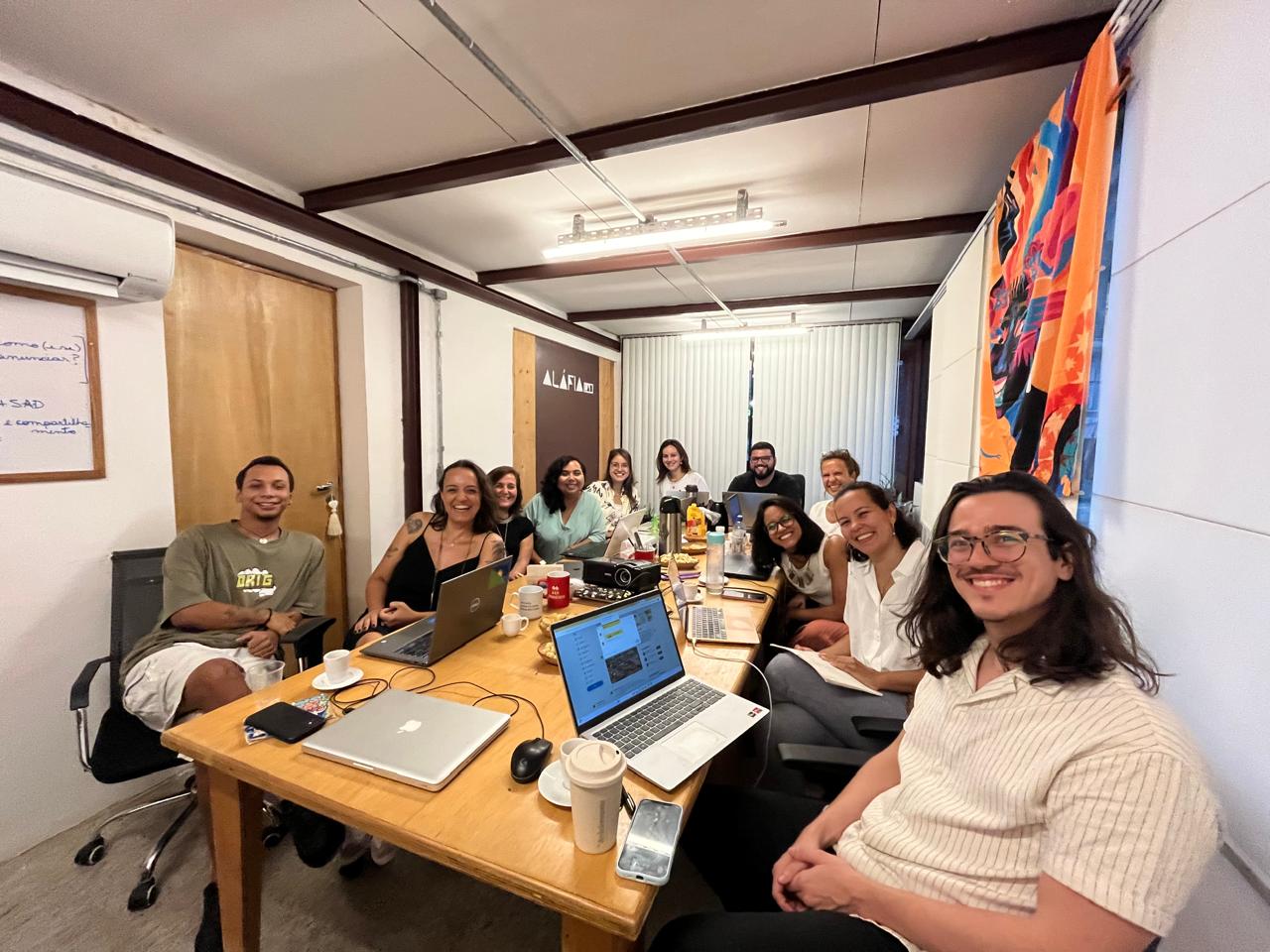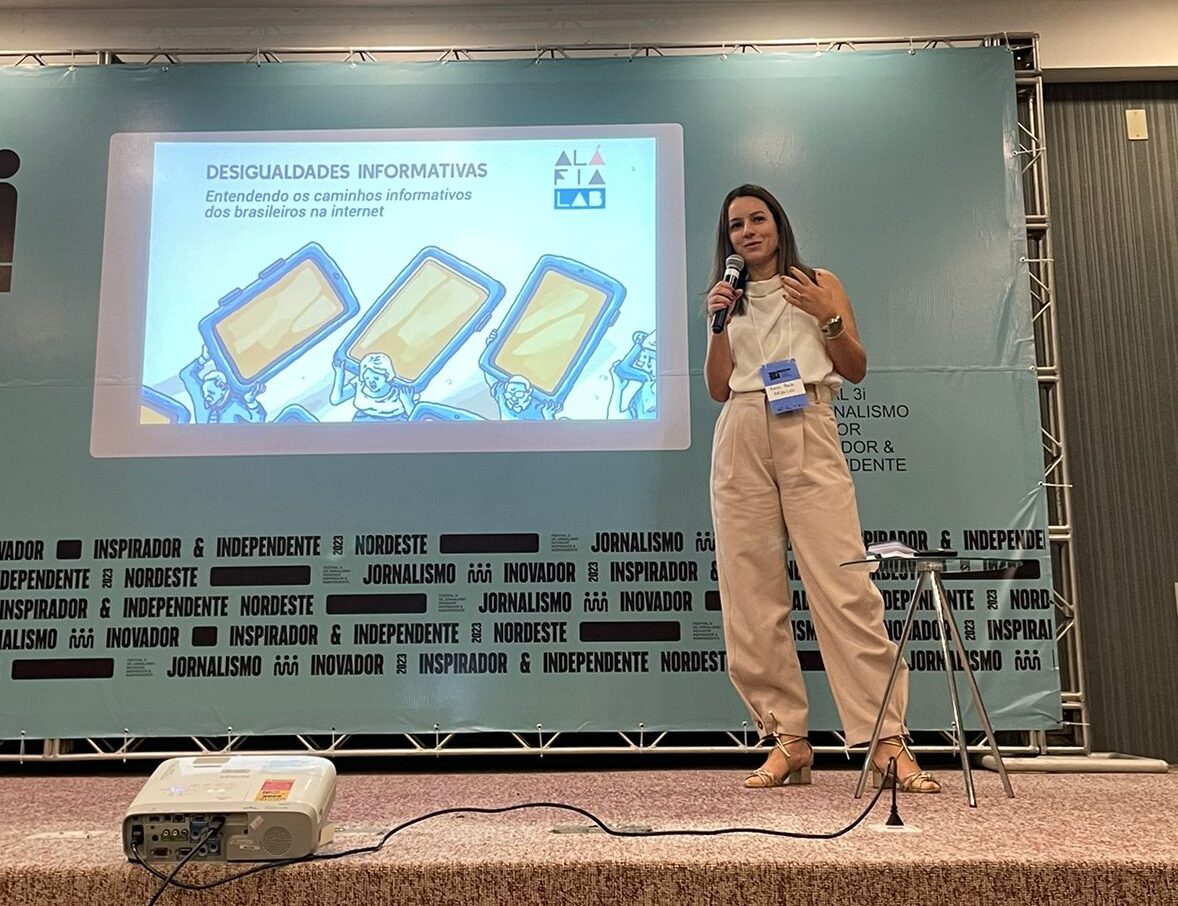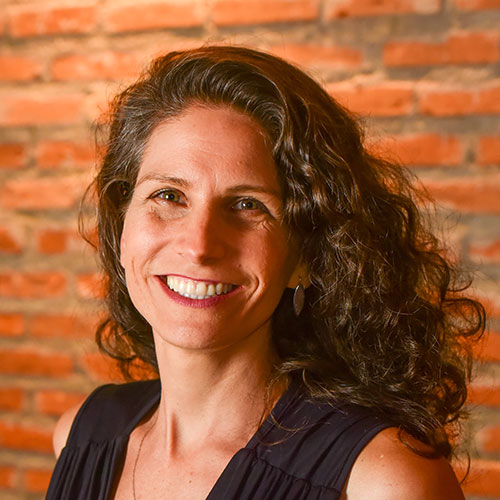Online behaviour deepens social problems, points out Aláfia Lab
With reports on online racism, fake news, and information consumption, the innovative research centre in Salvador (a city in the Brazilian Northeast) mobilizes debate on the internet, democracy and public policies


To produce and use knowledge to generate social impact. This is the proposal of Aláfia Lab, an independent research centre that has been observing the consequences of the use of digital networks in Brazilian society. The research identifies problems and other sensitive issues of people’s behaviour on the internet and, from there, designs possible solutions to be adopted by spheres of power.
The centre was founded in Salvador, the capital of the state of Bahia, in 2022 by journalists and researchers Maria Paula Almada, Rodrigo Carreiro and Nina Santos. Specializing in the debate on the internet and democracy, researchers develop nationally-reaching projects related to mapping online behaviour. The most recent research focuses on informational inequalities, a racism observatory on social networks and the 2024 elections.
Projects are carried out in partnership with other institutions, such as Zygon and Alma Preta, and are supported by Open Society, Ibirapitanga, Luminate and the Ford Foundation. “We share knowledge, exchange with other actors and civil society organizations that are interested in the same topics as us, and see how this can positively influence public policies”, says Maria Paula Almada, project director of Aláfia Lab.
Regulation of social media
For researchers at Aláfia Lab, the digital space can be a powerful venue for transformation, constituting a means for minority voices to be heard, for example. However, often online behaviour deepens social problems, such as in the case of racism.
Therefore, the organization’s main objective is to work alongside governmental institutions so that research results can inform public policies aimed at addressing such behaviour. The organization is also seeking dialogue with digital platforms.
“The speech at the beginning of the internet was that it would be a space of total freedom. And for a while, that’s what happened. But when the sphere of public discussion moved to the digital realm, mainly to social networks, it became a big problem because there’s this idea that they are two different spaces, real life and virtual life, but that doesn’t exist. We are connected all the time, life is one”, points out Rodrigo Carreiro, research director at Aláfia Lab.
“And regulation is coming after the facts, after social changes, when it should actually come together. So, there’s a general misunderstanding, not only in Brazil, that digital is a place of total freedom when, in fact, it should follow the same rules as society”, he warns.

Racism
One of Aláfia Lab’s projects is the observatory of racism on social media. To conduct the study, researchers tracked emblematic cases of online racism over two years, as well as monitoring 26 profiles of public figures including journalists, intellectuals, influencers, football players, etc.
Among the main results, the study identified that people cheat platform moderation by using GIFs, emojis, images and words that are not overtly offensive but may carry racist connotations depending on the context. This complicates efforts to combat racism on social networks.
“Identifying racism on the internet isn’t as simple as it seems. There’s racism in explicit forms, of course. However, a significant portion of people do it in a veiled and tangential manner, using tricks that the platforms themselves make available, such as emojis. So, identification is based on the context of that situation”, Carreiro points out.
The reports are available in the library of the Ministério da Igualdade Racial (‘Ministry of Racial Equality’), and their information will be used to create a guidebook in collaboration with the Supreme Federal Court (STF). “Racism is a societal problem; it wasn’t born with the internet, so it’s a structural issue. That’s why we’re constantly in conversation with organizations that address racism more broadly, while also identifying the new dynamics of social networks”, explains Almada.
According to the 2022 Demographic Census by IBGE – Instituto Brasileiro de Geografia e Estatística (‘Brazilian Institute of Geography and Statistics’), approximately 56% of the Brazilian population is Black (45.3% self-identify as Brown and 10.6% as Black). When we talk about Bahia, another piece of data catches our attention: the Bahian population is predominantly composed of self-declared Black individuals: in 2022, 80.8% identified themselves as belonging to the Black race (composed of Black and Brown). Salvador is, in fact, the city with the largest Black population outside of Africa.
Online behaviour
The study also revealed that the online life of black public figures is marked by combating racism, overshadowing their talents. Carreiro mentions the case of the soccer player Vini Júnior, who, in five months between October 2023 and February 2024, received racist attacks in 91% of his social media posts, forcing him to constantly take a stand.
To address these cases, Carreiro explains, platforms should adopt moderation rules adapted to local contexts. “Moderation rules are usually transported from the United States to here and do not consider local contexts. And this moderation needs to be done with qualitative analysis of situations; it’s not possible to have almost 100% automated moderation as current tools do”, the researcher suggests.
He reminds us that there are far more compliments than racism on social networks. However, even though racist comments are in the minority, they gain traction due to the very logic of how platforms operate. “If there’s a racist comment and it’s liked by several people, the platform doesn’t analyze whether this is a positive or negative thing. And the more you like a comment, the more it stays at the top”.
This results in the erasure of the stories of black individuals. “If Lázaro Ramos releases a movie, people don’t talk about the quality of the film, only that he is black. So, he needs to combat racism all the time, making all his other achievements invisible”, Almada emphasizes.


Disinformation
Research from Aláfia Lab has also indicated that people have been preferring digital media over traditional media for information. This new behaviour, besides transforming the relationship with information, tends to increase consumers’ exposure to disinformation.
“The term disinformation is old, it’s linked to war studies. However, today, it’s part of an industrial production model. That is, there are people gaining space and money from it. And with social media, the reach of this disinformation is very fast. Everything is distributed quickly, which often makes the effects difficult to measure”, explains Carreiro.
Another point to consider is trust in information. “The more disinformation grows, the less trust there is in the media. And this is a current phenomenon that also impacts other areas, such as science itself. We saw this during the pandemic… people literally died because of disinformation”, he warns.
In this context, Aláfia Lab has incorporated into its scope the management of the Desinformante website, which covers journalistic processes and effects of disinformation worldwide, as well as articles and reports on Artificial Intelligence. This year, the focus will be on monitoring elections.
“Every election year is more prone to disinformation. The current phenomenon emerged precisely during this period. And it’s not just politicians who benefit from fake news; some individuals gain visibility and money from it. That’s why regulation is so important”, Carreiro argues.
Would you like to support this cause?
Aláfia Lab is an independent research centre that produces and utilizes knowledge about the digital realm to transform society. Learn more on the website or follow us on Instagram and Linkedin.



